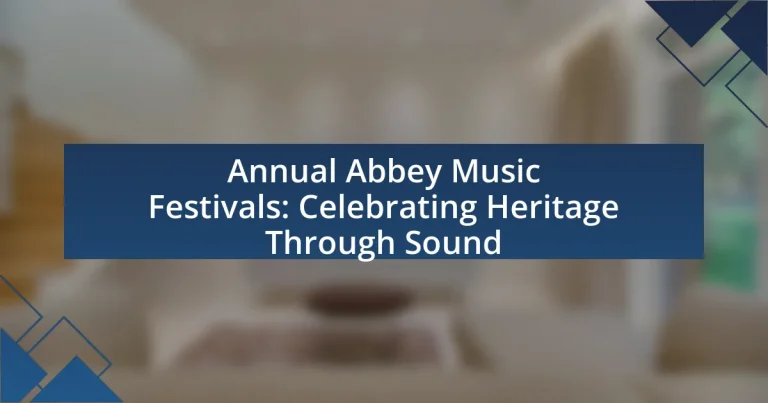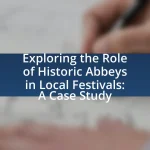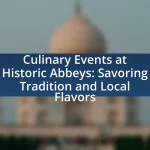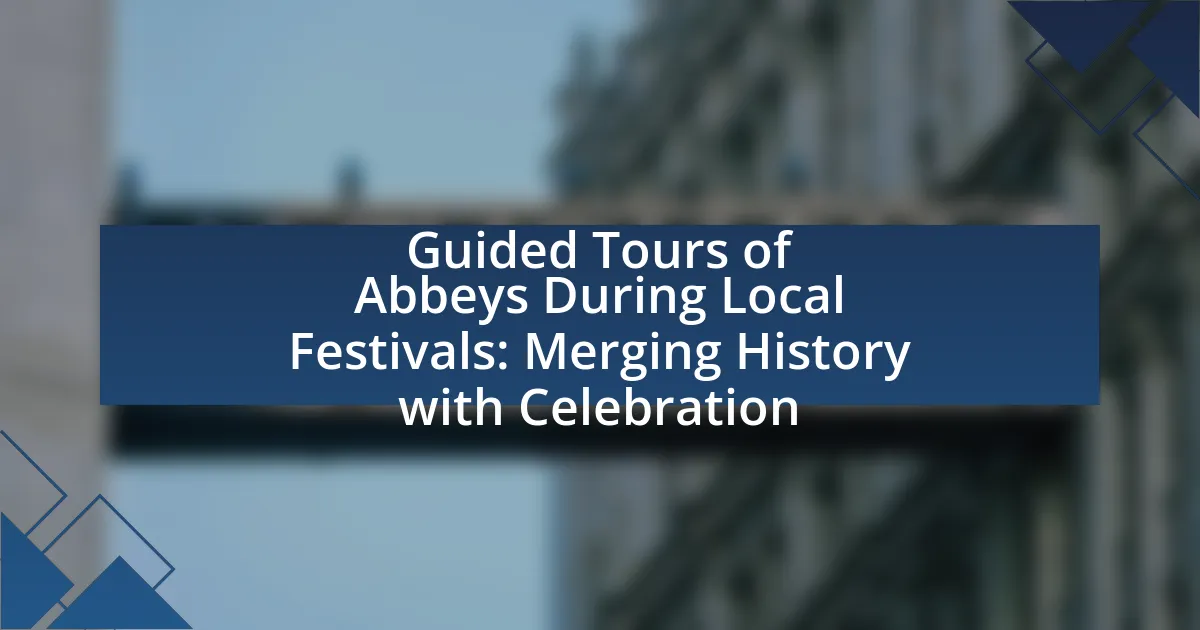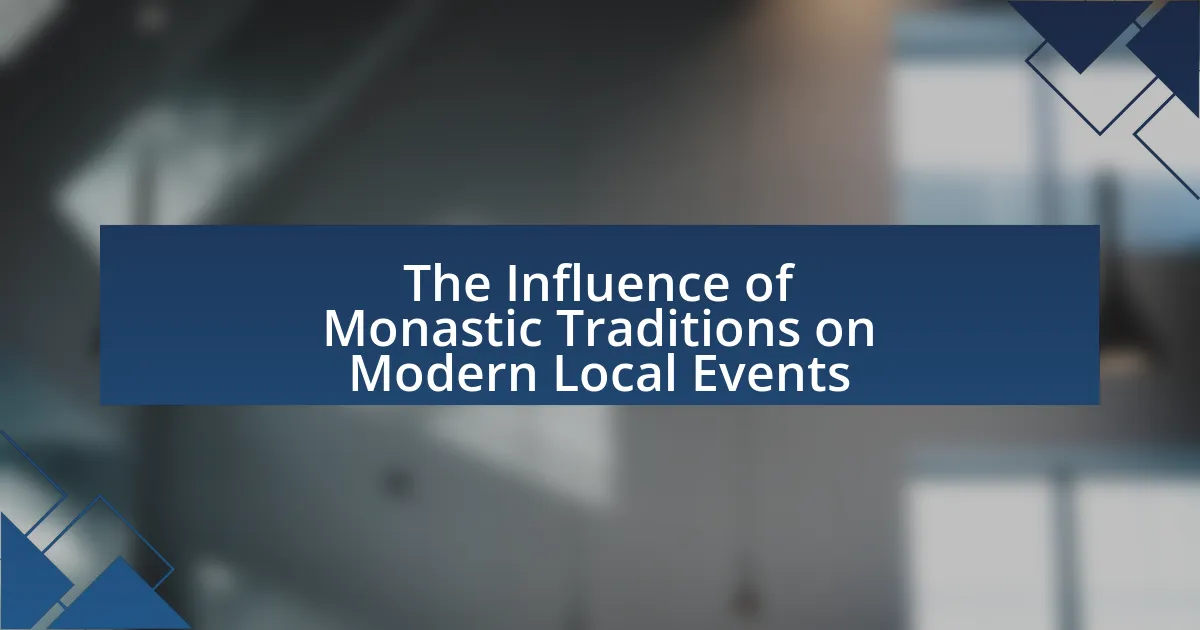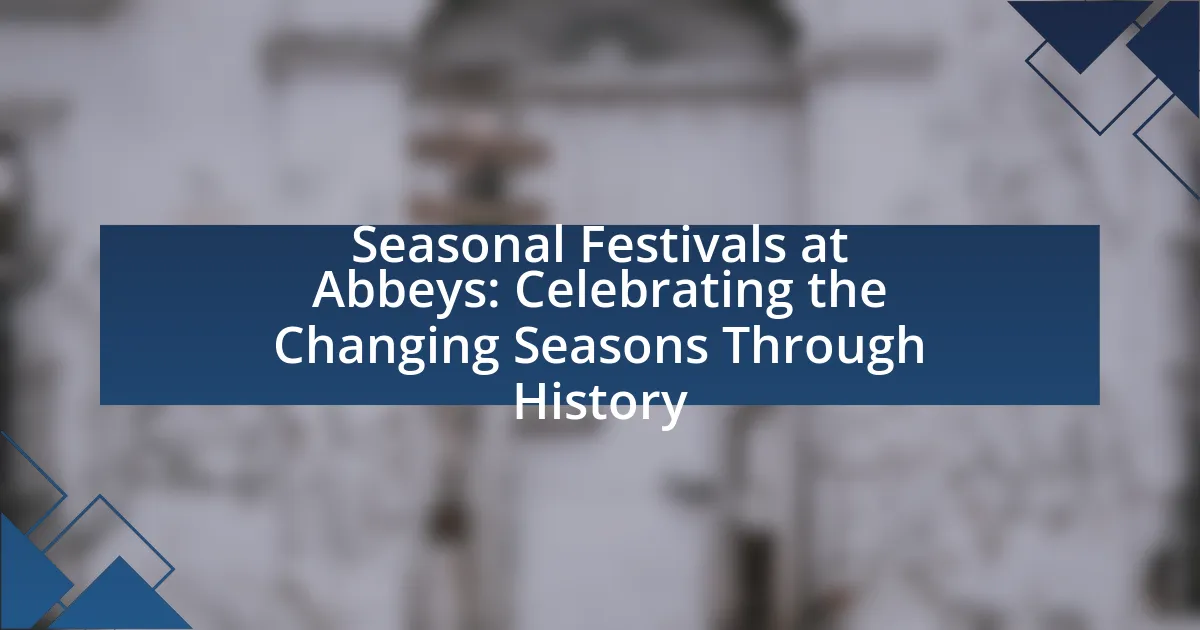Annual Abbey Music Festivals are annual cultural events held at abbey locations, showcasing a diverse range of musical performances that celebrate local heritage and community. These festivals feature both local and international artists, workshops, and activities that engage attendees in the musical traditions tied to the abbey’s history. The events play a crucial role in preserving cultural heritage, fostering community spirit, and boosting local tourism and economies. Key components of the festivals include a variety of music genres, local artist participation, and a structured planning process involving community stakeholders, all aimed at enhancing cultural appreciation and social cohesion.
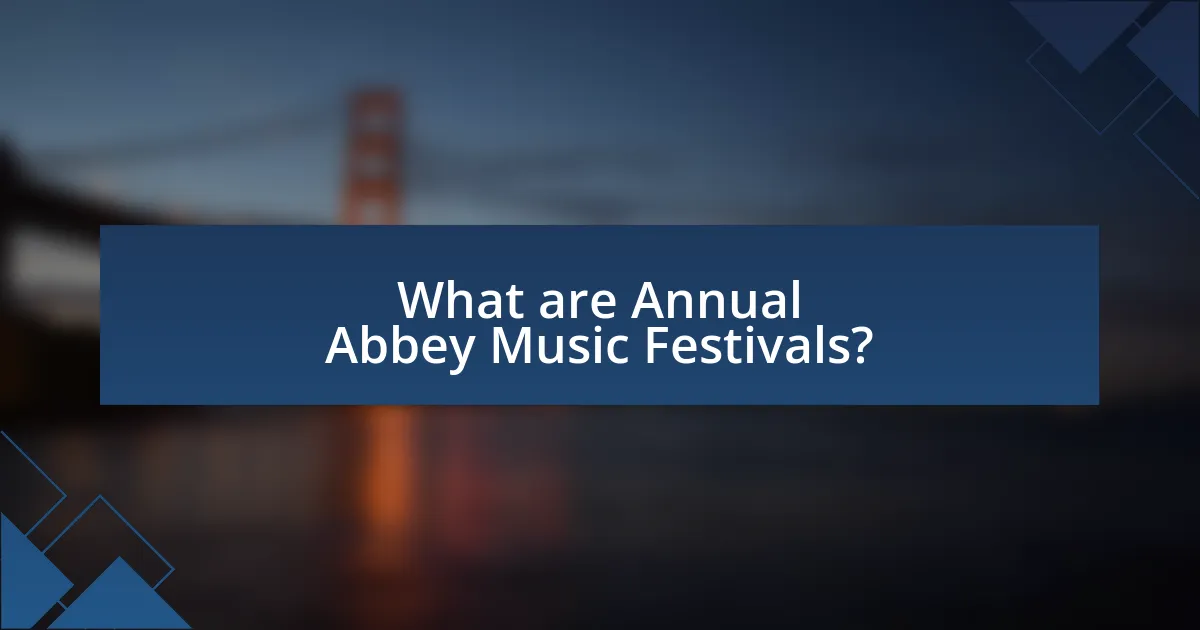
What are Annual Abbey Music Festivals?
Annual Abbey Music Festivals are cultural events held each year at abbey locations, featuring a variety of musical performances that celebrate heritage and community. These festivals typically include performances by local and international artists, workshops, and activities that engage attendees in the musical traditions associated with the abbey’s history. The festivals aim to promote cultural appreciation and often highlight the architectural and historical significance of the abbey itself, drawing visitors interested in both music and heritage.
How do Annual Abbey Music Festivals celebrate cultural heritage?
Annual Abbey Music Festivals celebrate cultural heritage by showcasing traditional music, dance, and art forms that reflect the historical and cultural narratives of the community. These festivals often feature performances by local artists and musicians who draw upon regional folk traditions, thereby preserving and promoting cultural practices that may otherwise be at risk of fading. For instance, the inclusion of specific genres, such as Gregorian chant or regional folk music, highlights the unique cultural identity of the area. Additionally, workshops and interactive sessions at these festivals engage attendees in learning about their heritage, fostering a deeper appreciation and understanding of cultural roots.
What historical significance do these festivals hold?
Annual Abbey Music Festivals hold significant historical importance as they serve to preserve and promote cultural heritage through musical traditions. These festivals often commemorate historical events, celebrate local customs, and foster community identity, reflecting the unique history of the regions in which they are held. For instance, many festivals feature music that has been passed down through generations, showcasing traditional instruments and styles that are integral to the cultural narrative of the area. This preservation of musical heritage not only educates attendees about their history but also strengthens communal bonds, making these festivals vital for maintaining cultural continuity.
How do the festivals reflect the local community’s traditions?
Festivals reflect the local community’s traditions by showcasing unique cultural practices, music, and art forms that have been passed down through generations. For instance, the Annual Abbey Music Festivals often feature traditional music styles that are integral to the community’s identity, such as folk songs and regional instruments. These events serve as a platform for local artists to perform, thereby preserving and promoting the community’s heritage. Additionally, the inclusion of traditional food, dance, and storytelling during the festivals reinforces the cultural narratives and values that define the community. This connection to heritage is evident in the participation of local families and the emphasis on communal activities, which strengthen social bonds and foster a sense of belonging among residents.
What types of music are featured at Annual Abbey Music Festivals?
Annual Abbey Music Festivals feature a diverse range of music genres, including classical, folk, jazz, and contemporary styles. These festivals celebrate cultural heritage and often showcase local artists alongside internationally recognized performers, creating a rich tapestry of sound that reflects the community’s musical traditions. The inclusion of various genres allows for a broad appeal, attracting audiences with different musical tastes and fostering an appreciation for both historical and modern influences in music.
How do different genres contribute to the festival experience?
Different genres significantly enhance the festival experience by attracting diverse audiences and creating varied atmospheres. For instance, genres like folk and classical evoke a sense of tradition and cultural heritage, aligning with the theme of the Annual Abbey Music Festivals. In contrast, genres such as rock and electronic music introduce energy and excitement, appealing to younger demographics. This genre diversity not only enriches the auditory experience but also fosters community engagement, as attendees connect over shared musical preferences. Research indicates that festivals featuring multiple genres can increase attendance by up to 30%, demonstrating the impact of genre variety on overall participation and enjoyment.
What role do local artists play in the music selection?
Local artists significantly influence music selection at the Annual Abbey Music Festivals by showcasing regional sounds and cultural heritage. Their involvement ensures that the music reflects the community’s identity, as local artists often draw inspiration from traditional styles and contemporary influences unique to the area. This connection to local culture not only enriches the festival experience but also promotes the preservation of musical traditions, making the event a celebration of both heritage and innovation.
Why are Annual Abbey Music Festivals important for community engagement?
Annual Abbey Music Festivals are important for community engagement because they foster social cohesion and cultural appreciation among diverse groups. These festivals provide a platform for local artists and musicians to showcase their talents, which enhances community pride and identity. Additionally, they attract visitors, stimulating local economies and encouraging collaboration among businesses, non-profits, and residents. Studies have shown that community events like music festivals can increase participation in local activities and strengthen community ties, making them vital for enhancing social networks and cultural heritage.
How do these festivals foster community spirit?
Annual Abbey Music Festivals foster community spirit by bringing together diverse groups of people to celebrate shared cultural heritage through music. These festivals create a sense of belonging and unity as attendees participate in communal activities, such as live performances, workshops, and local food offerings. Research indicates that community events like music festivals enhance social cohesion by encouraging interactions among residents, fostering friendships, and promoting local pride. For example, a study by the National Endowment for the Arts found that participation in arts events significantly increases community engagement and strengthens social ties.
What impact do they have on local tourism and economy?
Annual Abbey Music Festivals significantly boost local tourism and economy by attracting visitors who contribute to spending in the area. These festivals draw thousands of attendees, leading to increased occupancy in hotels, restaurants, and local shops. For instance, a study by the National Endowment for the Arts found that cultural events can generate up to $4 in economic activity for every $1 spent on the event itself. Additionally, local businesses often report a surge in sales during festival weekends, highlighting the direct financial benefits to the community.
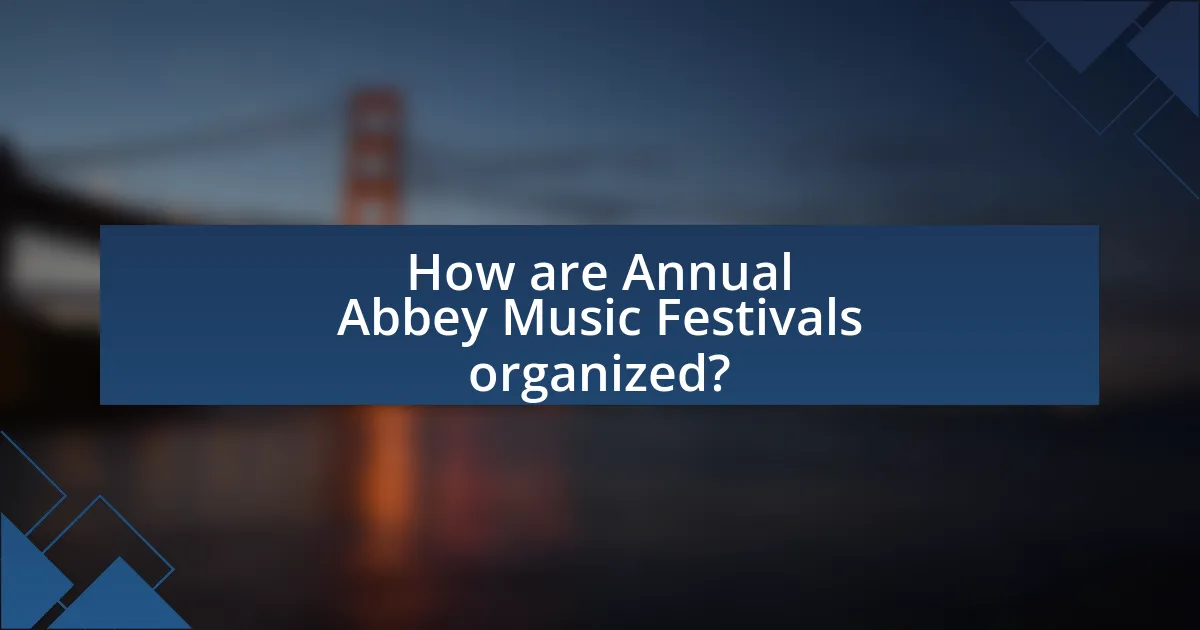
How are Annual Abbey Music Festivals organized?
Annual Abbey Music Festivals are organized through a structured planning process that involves multiple stages. Initially, a committee is formed, typically comprising local community members, musicians, and cultural representatives, to oversee the festival’s development. This committee is responsible for selecting a theme that reflects the heritage and cultural significance of the abbey, which guides the festival’s programming.
Next, logistical arrangements are made, including securing permits, arranging for sound equipment, and coordinating with vendors for food and merchandise. The committee also reaches out to artists and performers, often prioritizing those who align with the festival’s theme and can attract a diverse audience. Marketing efforts are then implemented to promote the event, utilizing social media, local press, and community outreach to maximize attendance.
Finally, on the day of the festival, volunteers and staff manage the event’s operations, ensuring that performances run smoothly and attendees have a positive experience. This organized approach has been effective in creating successful festivals that celebrate local heritage through music, as evidenced by the growing attendance and community engagement seen in past events.
What are the key components of planning an Annual Abbey Music Festival?
The key components of planning an Annual Abbey Music Festival include securing a venue, curating a diverse lineup of artists, establishing a budget, promoting the event, and ensuring logistical arrangements. Securing a venue involves selecting an appropriate location that aligns with the festival’s theme and can accommodate the expected audience size. Curating a diverse lineup of artists ensures a variety of musical genres, which can attract a broader audience and enhance the festival’s appeal. Establishing a budget is crucial for managing expenses and revenue, including artist fees, marketing costs, and venue rental. Promoting the event through various channels, such as social media, local media, and partnerships, is essential for maximizing attendance. Lastly, ensuring logistical arrangements, including sound equipment, security, and amenities for attendees, is vital for a successful festival experience.
Who are the main stakeholders involved in the organization?
The main stakeholders involved in the organization of the Annual Abbey Music Festivals include local government authorities, festival organizers, musicians, sponsors, and the community. Local government authorities provide necessary permits and support for the event, while festival organizers are responsible for planning and executing the festival. Musicians perform and contribute to the cultural aspect of the festival, sponsors provide financial backing and resources, and the community participates as attendees and volunteers, enhancing the festival’s impact on local heritage.
What logistical challenges must be addressed during planning?
Logistical challenges that must be addressed during planning include venue selection, resource allocation, and coordination of transportation. Venue selection is critical as it impacts accessibility, capacity, and acoustics, which are essential for a successful music festival. Resource allocation involves budgeting for equipment, staffing, and permits, ensuring that all necessary materials are available on time. Coordination of transportation is vital for both attendees and performers, requiring effective management of parking, public transport options, and shuttle services. Addressing these challenges is supported by industry data indicating that 70% of event organizers cite logistical issues as a primary factor in event success or failure.
How is the festival program developed?
The festival program is developed through a collaborative process involving various stakeholders, including festival organizers, artists, and community representatives. This process typically begins with identifying the festival’s theme and objectives, which in the case of the Annual Abbey Music Festivals, focuses on celebrating cultural heritage through music. Organizers then curate a lineup of performers and activities that align with these goals, often incorporating local talent and traditional music forms to enhance community engagement. The program is finalized after considering logistical factors such as venue capacity, scheduling, and audience preferences, ensuring a diverse and enriching experience for attendees.
What criteria are used to select performers and acts?
Performers and acts for the Annual Abbey Music Festivals are selected based on their artistic quality, relevance to the festival’s theme of heritage, and audience appeal. The selection process involves evaluating the performers’ previous work, their ability to engage with cultural narratives, and their contribution to the music genre represented at the festival. Additionally, a committee reviews applications and considers factors such as originality, technical skill, and the potential to enhance the festival experience for attendees.
How does the festival schedule accommodate various audiences?
The festival schedule accommodates various audiences by offering a diverse range of performances and activities tailored to different age groups and interests. For instance, family-friendly events are scheduled during the day, while evening performances feature more mature themes and genres. Additionally, workshops and interactive sessions are included to engage attendees of all skill levels, from beginners to experienced musicians. This approach ensures that the festival appeals to a broad demographic, enhancing community participation and cultural appreciation.
What role does marketing play in the success of Annual Abbey Music Festivals?
Marketing is crucial for the success of Annual Abbey Music Festivals as it drives attendance, enhances brand visibility, and fosters community engagement. Effective marketing strategies, such as targeted social media campaigns and partnerships with local businesses, increase awareness and attract diverse audiences. For instance, festivals that utilize data analytics to understand audience preferences can tailor their promotions, resulting in higher ticket sales and participation rates. Additionally, successful marketing efforts often lead to increased sponsorship opportunities, which can provide essential funding for festival operations and growth.
How can social media be effectively utilized for promotion?
Social media can be effectively utilized for promotion by creating engaging content that resonates with the target audience and leveraging platform-specific features. For instance, using visually appealing images and videos on platforms like Instagram and TikTok can capture attention, while Facebook events can facilitate community engagement and ticket sales. According to a 2021 report by Hootsuite, 54% of social media users use these platforms to research products, indicating that effective promotion can drive awareness and interest. Additionally, utilizing targeted advertising on platforms such as Facebook and Instagram can reach specific demographics, enhancing the likelihood of attracting attendees to events like the Annual Abbey Music Festivals.
What strategies attract diverse audiences to the festival?
To attract diverse audiences to the festival, organizers implement inclusive programming, targeted marketing, and community engagement initiatives. Inclusive programming features a variety of musical genres and cultural performances that resonate with different demographic groups, ensuring representation of various heritages. Targeted marketing strategies utilize social media platforms and local community networks to reach underrepresented populations, promoting the festival in languages and contexts relevant to those communities. Community engagement initiatives, such as partnerships with local cultural organizations and schools, foster a sense of ownership and connection to the festival, encouraging participation from diverse groups. These strategies have been shown to increase attendance and enhance the festival’s cultural richness, as evidenced by attendance data indicating a rise in participation from various ethnic backgrounds over recent years.
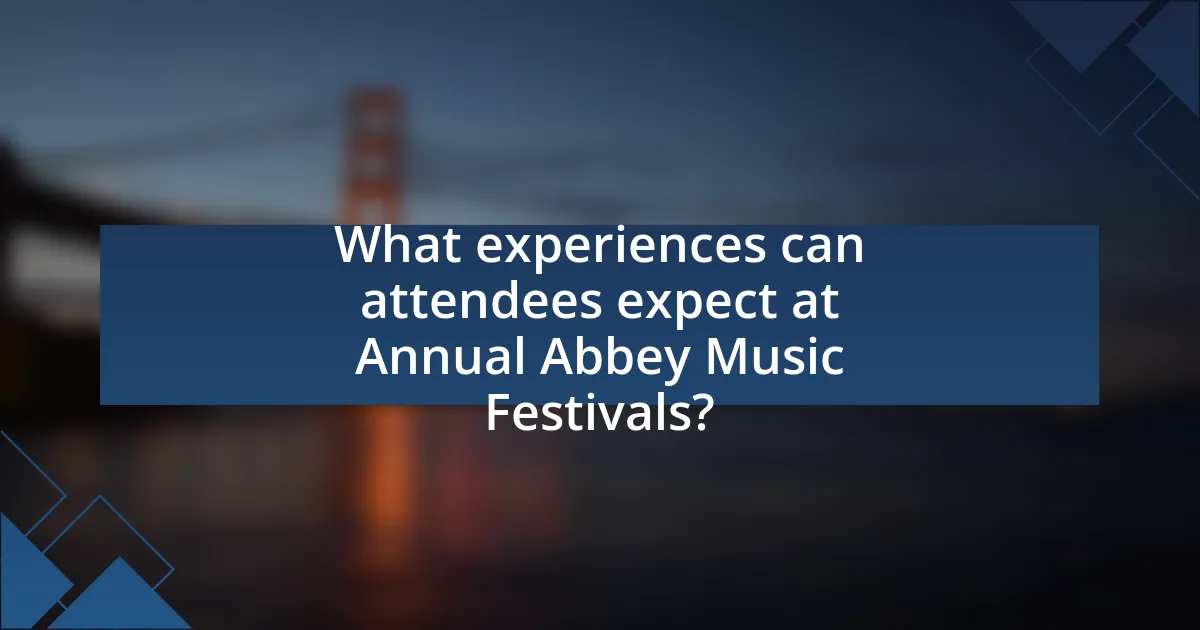
What experiences can attendees expect at Annual Abbey Music Festivals?
Attendees at the Annual Abbey Music Festivals can expect a diverse range of musical performances that celebrate cultural heritage. The festivals typically feature local and international artists across various genres, including folk, classical, and contemporary music, providing a rich auditory experience. Additionally, attendees can participate in workshops and discussions that delve into the history and significance of the music being performed, enhancing their understanding and appreciation of the cultural context. The festivals also often include food and craft vendors, showcasing local cuisine and artisan products, which further immerse attendees in the regional culture.
How do Annual Abbey Music Festivals enhance the attendee experience?
Annual Abbey Music Festivals enhance the attendee experience by providing a unique blend of cultural heritage and live music performances in historic settings. These festivals often feature a diverse lineup of artists, allowing attendees to enjoy various genres while immersing themselves in the rich history of the abbey. The combination of stunning architecture and acoustics creates an exceptional atmosphere that elevates the overall enjoyment of the performances. Additionally, interactive workshops and community engagement activities foster a sense of belonging and connection among attendees, further enriching their experience.
What types of activities and attractions are available beyond music?
Annual Abbey Music Festivals offer a variety of activities and attractions beyond music, including art exhibitions, food and drink tastings, workshops, and cultural performances. Art exhibitions showcase local artists and their works, providing a visual complement to the musical experience. Food and drink tastings feature regional cuisine and beverages, allowing attendees to explore local flavors. Workshops often include hands-on experiences in crafts, dance, or instrument-making, engaging participants in creative activities. Cultural performances, such as dance troupes or theater groups, enrich the festival atmosphere by highlighting diverse traditions and stories. These elements collectively enhance the festival experience, making it a multifaceted celebration of heritage.
How do food and beverage offerings contribute to the festival atmosphere?
Food and beverage offerings significantly enhance the festival atmosphere by providing sensory experiences that complement the music and cultural activities. These offerings create a communal space where attendees can gather, share, and enjoy diverse culinary traditions, fostering social interaction and engagement. For instance, festivals often feature local cuisine and beverages that reflect the region’s heritage, which not only supports local vendors but also enriches the cultural experience for attendees. Research indicates that food and drink can evoke emotions and memories, further deepening the connection participants feel to the festival and its cultural significance.
What are the best practices for attendees to enjoy the festival fully?
To fully enjoy the festival, attendees should plan their visit by reviewing the schedule of performances and activities in advance. This preparation allows attendees to prioritize must-see acts and allocate time for exploring food and craft vendors. Additionally, arriving early ensures a good spot for performances and reduces stress. Staying hydrated and wearing comfortable clothing enhances the overall experience, as festivals often involve long hours of standing and walking. Engaging with fellow attendees fosters a sense of community, enriching the festival atmosphere. Lastly, respecting the festival’s rules and guidelines contributes to a safe and enjoyable environment for everyone.
How can attendees prepare for varying weather conditions during the festival?
Attendees can prepare for varying weather conditions during the festival by checking the weather forecast in advance and dressing in layers. Dressing in layers allows individuals to adjust their clothing according to temperature changes, while waterproof jackets and sturdy footwear protect against rain and mud. Additionally, bringing sun protection such as hats and sunscreen is essential for sunny days. Historical data from past festivals indicates that attendees who prepared for weather variability reported a more enjoyable experience, highlighting the importance of proactive planning.
What tips can enhance the overall festival experience for first-time visitors?
To enhance the overall festival experience for first-time visitors, it is essential to plan ahead by researching the festival schedule, lineup, and venue layout. This preparation allows attendees to prioritize performances and navigate the festival efficiently. Additionally, arriving early can help secure a good spot for viewing performances and reduce stress. Engaging with festival-goers and participating in activities beyond music, such as food stalls and workshops, enriches the experience. Staying hydrated and wearing comfortable clothing are practical tips that contribute to overall enjoyment. According to a survey by Eventbrite, 78% of festival attendees reported that planning ahead significantly improved their experience, highlighting the importance of preparation.
